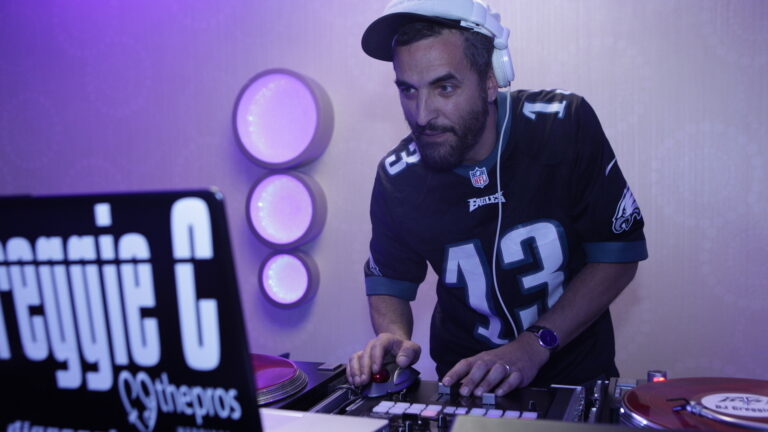In the latest issue of DJ LIFE Magazine, we shine a light on Greg Curran — and this DJ vet has no problem keeping Philly spinning.
Philadelphia – Greg Curran’s on a mission. As the owner of The DJ Entertainment School, DJ Greggie C teaches adults and kids how to DJ — it’s a pipeline to placements at some of Philly’s largest DJ companies.
And Curran’s as qualified a DJ as any to be a mentor. He’s the owner of Curran Entertainment, a multi-system business that offers photography, videography, duos/bands, equipment rental, slideshows, and music production – plus, he’s a wedding officiant.
We spoke to Curran, who will be presenting two seminars at DJX this August, and found out how he stays top of market in crowded Philly.
DJ LIFE: You’ve got a lot of services you’re offering. Did you start as a DJ and then expand?
Greg Curran: I started out as a DJ in the early 1990s. I got a job with a company that turned out to be the nation’s largest entertainment services provider that offered multiple services. Around 2006, I helped them add photo-booth services to the nation. Several years later, that company went through a major transition and laid off most of their management staff and executives, which gave me the opportunity to expand my own photo-booth business and provide my DJ services, as well as adding photography and videography and especially adding wedding officiants — which took off during the pandemic.
DJ LIFE: Do clients come through the door mostly for DJ services first or other services?
Curran: A big portion of my business revolves around disc-jockey, photo-booth, and wedding-officiant services, but we also do a fair amount of photography and videography.
DJ LIFE: You’ve got a staff of DJs. How do you train them?
Curran: All of my DJ, photography, and videography staff has a minimum of at least five years’ experience or more, especially if they are doing weddings. I encourage all of my staff, including disc jockeys, to continue their education, especially by networking, joining professional organizations, taking classes in their special field, and attending trade shows, especially DJX.
DJ LIFE: How is the Philadelphia-area market? Super-competitive?
Curran: I helped manage multiple different states when I worked as a manager years ago and I learned that the Philadelphia market was not only competitive, but very different from other areas because of the interesting demographics of the area and the types of parties that can be played. For example, you can do a country wedding and then, 20 minutes down the road, do a hip-hop wedding. Or a high-end bar mitzvah. But that can also be said for a lot of markets across the country that are similar to Philly. Because of the increasing popularity of disc jockeys that seems to increase every year, the major metropolitan cities get flooded with disc jockeys that grab a computer and a controller off Amazon and learn their trade on YouTube and that can pose a problem when trying to book events if you don’t know how to weed out certain clients that are looking to book that DJ who is probably only charging $100 a party.
DJ LIFE: How do you stand out from the competition?
Curran: Excellent service! We basically make sure that we exceed every client’s expectations and go the extra mile and make sure that they know that we are doing it for them in very subtle ways. Our reputation and word-of-mouth also helps give a boost to our business. One example would be our DJs do their best to try and entertain the crowd rather than be just music players.
DJ LIFE: Are you generating gigs mostly from referrals?
Curran: Referrals are a huge part of our business, but that also helps drive our presence on Google and other search engines, which provides a lot of bookings. We also attend bridal shows during the year and have several different marketing campaigns that we implement that help drive people to our website and, in turn, they turn into bookings.
DJ LIFE: Are weddings your company’s chief money maker?
Curran: Fifty percent of what we do are weddings and the rest is broken down into corporate events, schools, bars, clubs, and other private events. We also have a big crew that works the nightclub scene as audio visual technicians in the Philadelphia area.
DJ LIFE: When a client hires you to DJ, what should they expect? What do you bring to the party?
Curran: When I personally am hired to do a party, most of my clients expect an entertainer that, if need be, will get out there and show a couple of line dances or at least be involved on the microphone when needed. I go above and beyond the call to exceed my clients’ expectations and that is where a lot of my referral business comes from. Besides being a great MC and mixer, one of my talents is being able to read the crowd’s mind, if they are not throwing me a lot of requests, and play what they want to hear and keep them dancing. When they get me, they expect an exciting, energetic DJ that is not afraid to get out on the floor and join the party if needed. I also check in with my client during the event to make sure that everything is running smoothly and if there is anything else I can do for them.
DJ LIFE: Your set-up includes lots from Peavey – why those PA pieces?
Curran: When I started as a manager for the nation’s largest entertainment services company we equipped our DJs right after we hired them and the standard equipment that they got were Peavey column speakers and a Peavey mixer/amplifier. These speakers and amplifiers were beasts and produced great sound and acted like tanks out on the road. A large percentage of our DJs did not take care of the equipment and, because of that, the PV speakers and amplifiers went through a lot of wear and tear – but they lasted and this is why I decided to go with Peavey when I needed to purchase equipment. Then, years later attending DJ Expos, I met a local disc jockey named DJ Cutlass and he introduced me to the executives at Peavey and opened the door for my first sponsorship of many. Since then, I have upgraded my equipment and, besides my PA speakers and mixer, I also have a Peavey LN system and a 16-channel digital mixer that I love and bring to certain events where they are needed.
DJ LIFE: How often do you add to your audio/lighting setup?
Curran: I’m one of those DJs that likes to keep up with the times, but waits a bit, as well, just to be safe. With that being said, you’ve also heard the phrase “if it is not broke, don’t fix it.” But in this industry, you must keep up with the times to look good and make your brand look good, so you must invest in new equipment. So every few years, I like to upgrade or add something special to my rig, whether it’s the sound or lighting, like my Chauvet system I just upgraded. I am now working on bringing the DMX knowledge that I have gained from working in nightclubs in Philadelphia to my mobile set-up as well.
DJ LIFE: Tell me about the DJ Entertainment School – how did that start?
Curran: The DJ Entertainment School started in the early ’90s when I was working for a large wedding-services company called The Entertainment School. I purchased the company before the turn of the millennium and rebranded it as The DJ Entertainment School. I started teaching face-to-face classes immediately and that evolved into group classes and then online and streaming classes. I also wrote a book from the teachings of the class called The DJ Entertainment School: How to Do Weddings & Parties, and it is sold on Amazon.
DJ LIFE: What courses do you teach? What can a student expect to learn from the school?
Curran: We have wedding, beat-matching, scratching, and production classes, to name a few. Most DJs that come to the school, whether they’re old or young, want to learn how to set up the equipment they just bought and use it or they want to learn how to beat-match and scratch on the equipment that they have. Then, there are others that want to take classes on how to do weddings and basic parties or simply take their DJ game to the next level. Our philosophy at the DJ entertainment school is teaching our clients exactly what they want and giving them exercises to help them practice and achieve their goals.
DJ LIFE: What can DJX attendees expect from your seminars this year?
Curran: My first seminar on Aug. 8 is “Lifelong Lessons for Beginner DJs.” It’s basically an intro to DJing with all the basics. For example, I’ll explain everything that you need equipment-wise to be a DJ and how to set it up, tips on software, microphone technique, and hardware for the beginner and advanced DJs. We’ll have a discussion on networking and why it is important to attend trade shows and anywhere else that DJs assemble, so that you can learn from them and possibly get some business from them or share your business with them. We will also touch on the basics of social media, but this year we will discuss basic content and what to do to get that content.
DJ LIFE: And your second?
Curran: It’s set for Aug. 9, and it’s a “Pricing Panel” where we will discuss how to price out your parties or services in the demographic area that you live and how it can differ from place to place. This is shown to be a very controversial topic online and a lot of DJs have things to say about it. I figured DJX would be the perfect forum for us to discuss this highly contested issue.
DJ LIFE: You also get work outside the mobile-DJ arena, too, right?
Curran: Yes, and being a DJ and a music technician has helped further my career, especially in the audio-visual and lighting industries. I’m getting a lot of corporate audio-visual work at different companies on the East Coast. I also work at a club called Roar in Philadelphia – it’s currently one of the hottest nightclubs in the area. It actually encompasses three clubs in one – it has an indoor nightclub, an outdoor club/Tiki Bar, and a cigar bar/restaurant. I’m in charge of the lighting and visuals and audio throughout the club and I have a team of mostly DJs that help me run this club during the week, especially when I have mobile jobs.
DJ LIFE: Where do you see the business in five years?
Curran: I have seen the industry grow in the past 30 years. As I look forward to the future, I expect technology to keep making our jobs easier. Some examples include the equipment is going to get even lighter and stronger and have more capabilities. I also expect visualizations to possibly take off in the next few years as technology changes – for example, like 3D projection or holograms. I also expect that artificial intelligence will have a larger role to play in our industry, as well.
DJ LIFE: What is the most gratifying part of your job?
Curran: I’ve always said that when I get a round of applause at the end of the night… that makes everything worth it. I love putting smiles on people’s faces and helping them have a great time at the events they go to by playing the music that they love to dance to.
 Greg Curran’s Gear
Greg Curran’s Gear
2 Peavey PVXp 12 speakers
2 Peavey DM115 subs
1 Peavey PV 10 BT mixer
Shure BLX1288/SM35/SM58 wireless system
Pioneer DJ DDJ-REV7 controller
Serato DJ Pro software
Pro X Cases
Chauvet GigBAR2
Chauvet 4Bar LTBT
15 Par-56 uplights
Curve DSLR MAX Design Photobooth


